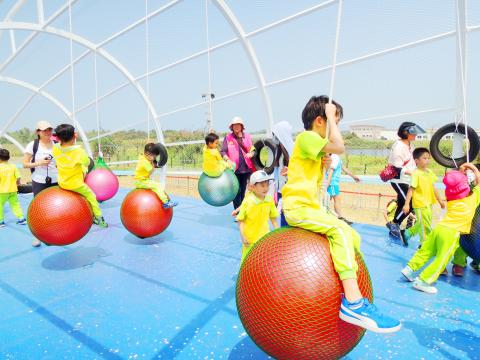Taiwan’s population might start to decline in 2022, three years earlier than the government forecasted in 2016, as fertility rates have become more parlous than expected, the National Development Council (NDC) said yesterday.
If left unchecked, the population might shrink by 30 percent by 2065, with the demographic dividend — the economic growth potential linked to a larger share of the working-age population than the non-working-age population — vanishing in 2027, NDC Minister Chen Mei-ling (陳美伶) said.
“The trend is worrying and demands quick and comprehensive remedies,” Chen told a news conference in Taipei, citing the council’s latest estimate on the nation’s demographics.

Photo: Hung Mei-hsiu, Taipei Times
New births fell by 5,800 in the first seven months of this year from the same period last year, as existing measures failed to reverse the decline, she said.
The council conducts a population estimate every two years to help guide response measures.
The fertility rate — the average number of children born per woman — dropped from 1.17 in 2016 to 1.13 last year, both slightly less than the prior forecast, the council said.
The nation’s population is now expected to peak in 2021 at 23.61 million people and then trend downward as more Taiwanese marry late and choose not to have children, it said.
The working population — those aged between 15 and 65 — might fall 10 percent in 2030, and the retreat might widen to 49.6 percent in 2065, it added.
A shrinking labor pool suggests lower productivity and bodes ill for the economy, Chen said.
One in two Taiwanese would be aged 50 or older in 2034, with the college-age population totaling fewer than 200,000 people in 2036, the council said.
Meanwhile, the number of people aged 65 or older would grow.
Taiwan became an aging society in March, with those aged 65 or older accounting for 14 percent of the population, Chen said, adding that the ratio is expected to surpass 20 percent in 2026.
European countries have raised their threshold for senior citizens from 65 to 67 years old to reflect a longer life span, she said.
The government has set a target of maintaining the population at more than 20 million people with a birth rate of 1.25 in 2022 and 1.4 in 2030, Chen said, adding that it has increased funding to support childcare and education in addition to a one-off subsidy for childbirth.
The government also plans to make Taiwan friendlier for immigration by easing residency and work requirements for foreigners, she said, adding that a proposal to make English an official language is part of that endeavor.

INVESTIGATION: The case is the latest instance of a DPP figure being implicated in an espionage network accused of allegedly leaking information to Chinese intelligence Democratic Progressive Party (DPP) member Ho Jen-chieh (何仁傑) was detained and held incommunicado yesterday on suspicion of spying for China during his tenure as assistant to then-minister of foreign affairs Joseph Wu (吳釗燮). The Taipei District Prosecutors’ Office said Ho was implicated during its investigation into alleged spying activities by former Presidential Office consultant Wu Shang-yu (吳尚雨). Prosecutors said there is reason to believe Ho breached the National Security Act (國家安全法) by leaking classified Ministry of Foreign Affairs information to Chinese intelligence. Following interrogation, prosecutors petitioned the Taipei District Court to detain Ho, citing concerns over potential collusion or tampering of evidence. The

NEGOTIATIONS: Taiwan has good relations with Washington and the outlook for the negotiations looks promising, Minister of Economic Affairs J.W. Kuo said Taiwan’s GDP growth this year is expected to decrease by 0.43 to 1.61 percentage points due to the effects of US tariffs, National Development Council (NDC) Minister Paul Liu (劉鏡清) said at a meeting of the legislature’s Economics Committee in Taipei yesterday, citing a preliminary estimate by a private research institution. Taiwan’s economy would be significantly affected by the 32 percent “reciprocal” tariffs slapped by the US, which took effect yesterday, Liu said, adding that GDP growth could fall below 3 percent and potentially even dip below 2 percent to 1.53 percent this year. The council has commissioned another institution

NEGOTIATIONS: The US response to the countermeasures and plans Taiwan presented has been positive, including boosting procurement and investment, the president said Taiwan is included in the first group for trade negotiations with the US, President William Lai (賴清德) said yesterday, as he seeks to shield Taiwanese exporters from a 32 percent tariff. In Washington, US Trade Representative Jamieson Greer said in an interview on Fox News on Thursday that he would speak to his Taiwanese and Israeli counterparts yesterday about tariffs after holding a long discussion with the Vietnamese earlier. US President Donald Trump on Wednesday postponed punishing levies on multiple trade partners, including Taiwan, for three months after trillions of US dollars were wiped off global markets. He has maintained a 10 percent

TRADE: The premier pledged safeguards on ‘Made in Taiwan’ labeling, anti-dumping measures and stricter export controls to strengthen its position in trade talks Products labeled “made in Taiwan” must be genuinely made in Taiwan, Premier Cho Jung-tai (卓榮泰) said yesterday, vowing to enforce strict safeguards against “origin laundering” and initiate anti-dumping investigations to prevent China dumping its products in Taiwan. Cho made the remarks in a discussion session with representatives from industries in Kaohsiung. In response to the US government’s recent announcement of “reciprocal” tariffs on its trading partners, President William Lai (賴清德) and Cho last week began a series of consultations with industry leaders nationwide to gather feedback and address concerns. Taiwanese and US officials held a videoconference on Friday evening to discuss the